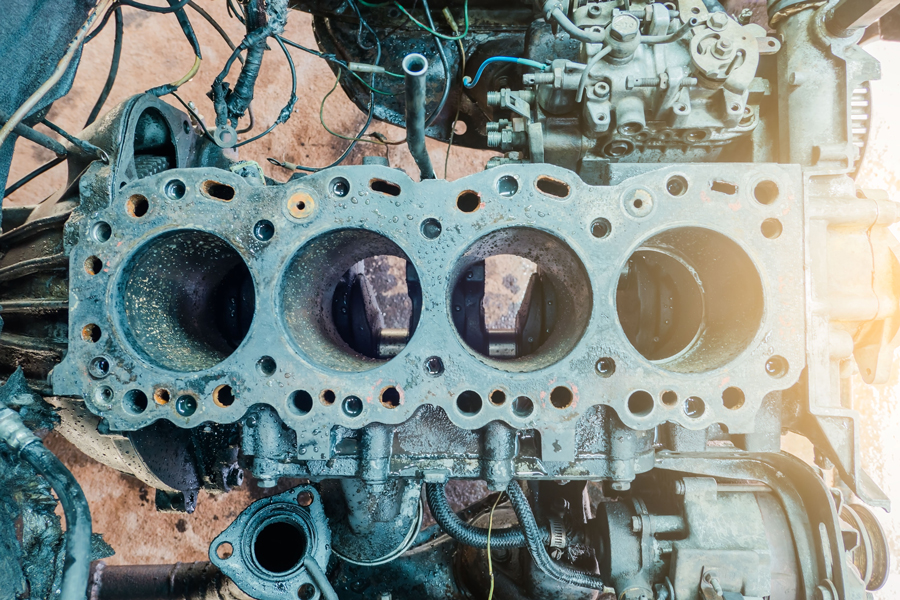
Usually the head gasket armor around the cylinders can become crushed and if this happens the seal is lost and your engine will lose compression leak coolant and the gasket will erode. Some car engines were poorly designed where the head gasket fails from normal operation and not due to any other causes.
If your engine is run hotter than it was designed to things will expand further than intended causing both the breakdown of the gasket material and the metal in your engine to warp causing a blown head gasket.
Blown head gasket cause. Blown head gasket causes. Your cars engine operates in extreme conditions with intense heat. If this heat becomes more than normal your engine can overheat causing a blown head gasket.
The extra heat results in the cylinder head and engine block expanding too much which results in a failure in the head gasket. What Can Cause a Blown Head Gasket. One of the best ways to prevent a catastrophic head gasket failure is to keep your car at the proper coolant levels.
In general blown head gasket causes can be divided into four main categories. There are several reasons that may lead to any one of these conditions. The biggest cause of a blown head gasket is overheating.
Usually the head gasket armor around the cylinders can become crushed and if this happens the seal is lost and your engine will lose compression leak coolant and the gasket will erode. Before replacing the gasket its vital that you find the cause of the overheating. It could be due to coolant leaks in the engine the hoses the radiator or the water pump.
The main reason for the blown head gasket is the extremely high temperature emitted from the engine. This high temperature is the result of the coolant leak or not having enough coolant in the radiator another reason if radiator fan motor does not work or cut off the fuse. A head gasket failure may be caused by an engine overheating one too many times as a result of a clogged radiator coolant leak faulty fan etc but the blown head gasket can also cause the engine to overheat.
The head gasket which is located between the engine block and cylinder head seals the combustion chambers to prevent compression loss. It also plays a role in sealing the coolant and oil passages running between the engine block and head. Head gasket failure is almost always the result of engine overheatingbut there are some instances where a head gasket can deteriorate over time or fail as the result of a manufacturing defect.
When a Head Gasket Fails The signs of a blown head gasket can be subtle. Here are eight of the most common indications that your head gasket has failed. An external oil or coolant leak at the seam between the engine block and cylinder head is a sign that you have a head gasket failure or a cracked block.
A blown cylinder head gasket can cause oil to mix with the antifreeze fluid. But the same can happen with a cracked engine block so another symptom must also be present. 2 Engine Overheating If the coolant is leaked into the oil then it wont be able to do its job properly of cooling down the engines components.
The failure of a head gasket between a coolant port and cylinder can cause leakage of the former into the latter. When this occurs a misfire is likely to happen during vehicle ignition especially if the motor is revved up cut and then restarted. The most common cause of a blown head gasket is engine overheating.
When the engine gets too hot the cylinder head expands thermal expansion which can crush the head gasket and cause failure. Once a head gasket has failed it can cause all manner of problems including. 1 An overheating engine.
The vast majority of head gasket leaks happen internally which means that coolant cant transmit into the combustion area on each intake. As a result The coolant starts to burn and evaporates giving off the appearance of creamy smoke filtering from out of the tailpipe. Whenever the head gasket is blown the problem is leaking coolant.
Coolant either leaks past the head gasket out of the engine or past the head gasket into the cylinder and combustion chamber. If you have an external leak you will notice coolant leaking from in between your engine block and the head. First the most common cause of a blown head gasket is overheating.
If your engine is run hotter than it was designed to things will expand further than intended causing both the breakdown of the gasket material and the metal in your engine to warp causing a blown head gasket. Mixed Coolant and Oil. Considering that its the head gaskets job to keep oil and coolant from mixing one of the most obvious and common signs that your head gasket has failed is a noticeable mixture of oil in the coolant system or coolant in the oil system.
The most common cause of a blown head gasket is engine overheating. The cause of a blown head gasket can also be due to a manufacturing defect or just high mileage. Some car engines were poorly designed where the head gasket fails from normal operation and not due to any other causes.
The main cause for a blown or damaged head gasket is extreme engine temperature. High engine temperatures are often caused by a coolant leak or just not having enough coolant in the radiator. It is important to note that different head gaskets will falter at different stages and temperatures.
